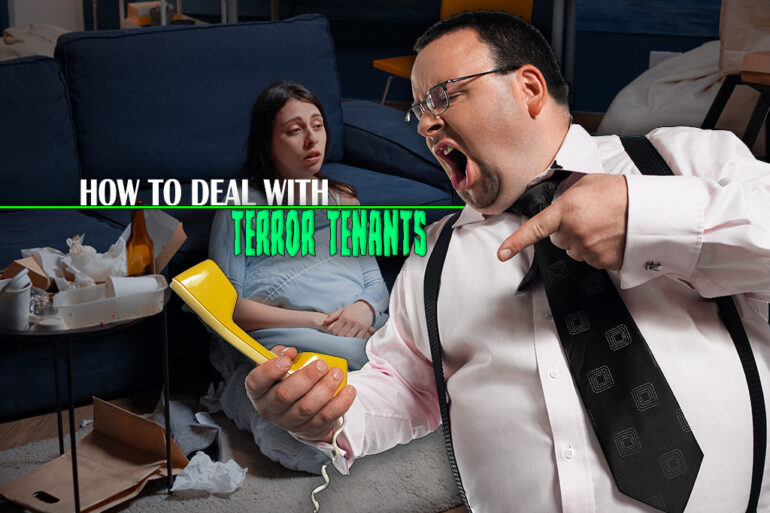How to Deal with Terror Tenants (and NOT End Up in Court)
United States tenant–landlord laws govern the relationship between tenants and landlords. Among other things, these laws stipulate procedures of conflict resolution between tenants and landlords through courts. Unfortunately, court processes can be long and costly, thus unfavorable.
How, then, can landlords deal with terror tenants without setting themselves up for a date with the judge? In this article, we give tips that can keep landlords out of courts while protecting them from rogue tenants.
The best way to deal with horrible tenants is to not have them in the first place. Landlords should conduct due diligence on potential tenants through thorough screening and background checks. This includes credit scores, criminal records, employment history, and tenancy history.
However, it is possible to end up with a bad tenant even after screening, so it is crucial to put in place safety measures.
Before Closing the Lease
If done well, these steps help you protect yourself in case the seemingly unproblematic tenant you recently scored goes rogue. All of them can be covered in the lease agreement.
Have a Strong Lease Agreement
A strong lease is based on proper understanding of federal, state, and local laws on tenancy and the rights of a landlord. In it, you can clearly outline your expectations and terms lawfully.
Although oral agreements are legally binding, written agreements are harder to dispute and therefore better.
You can involve a lawyer if unable to make one on your own, then go through it with your tenant to ensure they understand all the terms and sign against them. A strong legal document always dissuades problematic behaviors.
Payment Options
Receive rent using a payment option that makes it hard for your tenants to default or get late. Online payments over in person collection, for example, reduce contact between landlords and tenants and are easier to execute.
You can create payment alerts for due rent and late fees as well as keep a record of payment. Digital payments also allow tenants to create standing orders for their bills; this is convenient and encourages positive habits.
Security Deposit
Deposits can be used to recover due rent and cover damage to property.
You should not fail to collect security deposits for any reason whatsoever as it will make a huge difference when a terror tenant decides to disappear on you without fully executing the lease.
Maximum security deposits differ from state to state, ranging from one to three months’ worth of rent. Although there is no upper limit for deposits in Florida, requiring one months’ deposit, first and last month’s rent is popular amongst landlords to move into a rental.
Additionally, you can have the lease co-signed by a third party related to the tenant for recovery of rent when your tenant doesn’t pay.
Renters Insurance
Tenants can sue for everything and anything; when you have a terror tenant, you run a higher risk of lawsuits. You can lower the risk by requiring proof of renters insurance before handing over the keys to your property. This way, the tenant is compensated by their own insurance in the event of losses or accidents which sometimes are caused deliberately by tenants.
Renters insurance is very cheap — about $14 per month — and can also be bundled with car insurance at a discounted rate.
Move In and Move Out Checklist
Thoroughly go through your checklist with the tenant when moving in as well as when moving out. During move in, take pictures in the presence of the tenant and inform them they too can document the property if they wish to.
Have the same pictures on move out to compare with the recent state and show what will be charged if not remedied. This helps you have proof of damage and allows you to legally hold on to the security deposit pending resolution of the issue.
Similarly, conduct scheduled inspections religiously to keep abreast of the condition of the property and to remind tenants that you will easily find damages to your house.
Residential Security Guards for Multifamily Buildings
Having security around serves two purposes; it makes responding to problems quick and discourages destruction. Not only do would-be bad tenants tend to behave in the presence of security, but bad tenants generally avoid properties under security so they are unlikely to seek out your property. Note that this applies to multifamily apartment complex landlords only.
Enforce Rules Strictly
It is one thing to have a good lease, and another to make it work for you. Be very strict in enforcing the rules in your strong lease. A slight loosening of the terms can be abused by tenants in the future. However, strike a balance to be accommodating to tenants’ needs and create a good relationship.
After Closing the Lease
Even with the above considerations, you may end up with a terror tenant. The only recourse is to kick them out, but they often refuse to move out, leading to court-mandated evictions. You want to avoid courts at all costs, so try to legally get rid of them.
Refuse to Extend Lease
Definite lease durations usually last between six months and one year, and periodic leases are month to month.
At the end of every lease, a landlord has the right to refuse to renew it. Take advantage of this provision of the law to end a relationship with a terror tenant.
Prepare for this by giving a notice in accordance with the laws, which normally require 30, 60, or 90 days. In Florida, Notice of Non-Renewal should not be less than 60 days for year to year, 30 days for quarter to quarter, 15 days for month to month, and 7 days for week to week tenancy.
Terminate Lease for Violations
Violation of terms of the lease is also grounds for termination. Most lease violations involve a series of non or late payments, allowing the landlord to give a pay or quit notice.
Frequent complaints from neighbors, keeping pets in no-pet property, failure to properly maintain the property, or conducting criminal activities like selling drugs also constitute lease violation. A landlord can terminate a lease after giving notice according to the law.
Increase Rent and Security Deposits
Where applicable, especially in periodic rental agreements such as month to month, you can increase both the security deposit and rent. This should make a trouble tenant, who certainly wouldn’t want to pay more, leave your property in protest.
The downside is that this strategy doesn’t apply to a lease with terms and conditions that cannot be changed. You must give a 30-day notice of your intention to increase rent.
Understand Your Legal Obligations
As a landlord, you are required by law to offer services to your tenants to make their stay comfortable. However, some tenants abuse this and pester you now and then over issues not necessarily within your mandate. Understanding where your legal obligations end helps to remain within them.
Cash for Keys
When all fails, you may have to pay the terror tenant to vacate. Cash for keys is a rising practice, especially with past COVID-19 eviction moratoriums, that enables landlords to pay a given sum to a tenant to break a lease.
Tenants are willing to compromise to a cash for keys because the alternative of court eviction is expensive and damages their tenancy record.
Tread Carefully with Terror Tenants
There are various ways to deal with tenants and avoid courts. It is important to note that while these tips are practical, they can also prove highly intensive and time consuming. They also require a degree of experience and knowledge of the law that not every landlord has.
In such a situation, a property manager can come in handy to deal with the tenants on your behalf.







